
Working with children and young people who are vulnerable and have a special educational need requires an agile and inclusive practice. The most effective teachers and support staff know how to personalise learning. They can make real-time adjustments to their practice (or plans) when observations show that another approach will maximise and accelerate the pupil’s progress more effectively. Their practice is agile and inclusive because it is based on a secure understanding of learning theory and practice.
Learning strategy is based on a body of evidence that contributes to our shared understanding of what constitutes ‘good quality teaching and learning practice’. A lack of understanding of learning strategy will impede a pupil’s developmental achievements and make it harder to determine what learning strategies are most appropriate and when. This course aims to support practitioners, who are new to a teaching role or want to deepen their pedagogical knowledge and practice.
The course draws on the strategies outlined in the Sutton Trust Toolkit, such as giving feedback, making use of teaching assistants, and effective interventions to support students with special educational needs and disabilities (SEND).
The course content relates to learners in compulsory education (4-18 years), however, the strategies can be contextualised and across all educational stages. You will learn how to assess the needs of a learner and go on to develop a support plan consisting of SMART goals and interventions, which you will implement and later review to determine how well it has met the learner’s specific developmental needs.
This course responds to the information needs of the whole community centred around the child/young person with SEND. Parents and carers benefit from raised awareness of how to support their child’s learning needs. Advisory teachers, therapists and educational psychologists gain access to evidence-based CPD resources that can be used to strengthen capacity in their local authority and schools. Schools can use this course to train individuals or groups of teachers and teaching support staff as part of a school’s improvement plan or a whole-school initiative. NQTs/RQTs also build a secure knowledge of learning theory at the start of their career.
Parents are also encouraged to take our free Learning Theory course.
Our courses are structured into four sections. Click on the section headings to reveal page titles and some example content.
Learn about the most useful learning theories and how they inform teaching and learning practice. Engage with the debate about the limitations and major criticisms of these theories.
- Section objectives
- Theories of learning
- The learning process
-
Special educational needs
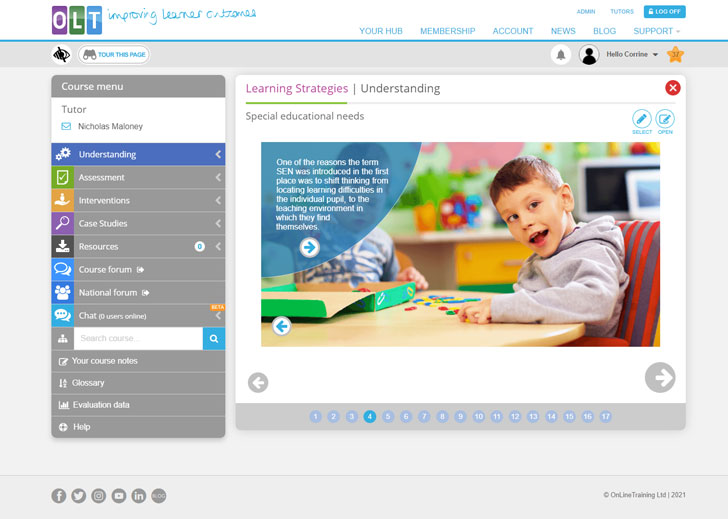
Screenshot from Understanding page 4 -
Learning theories
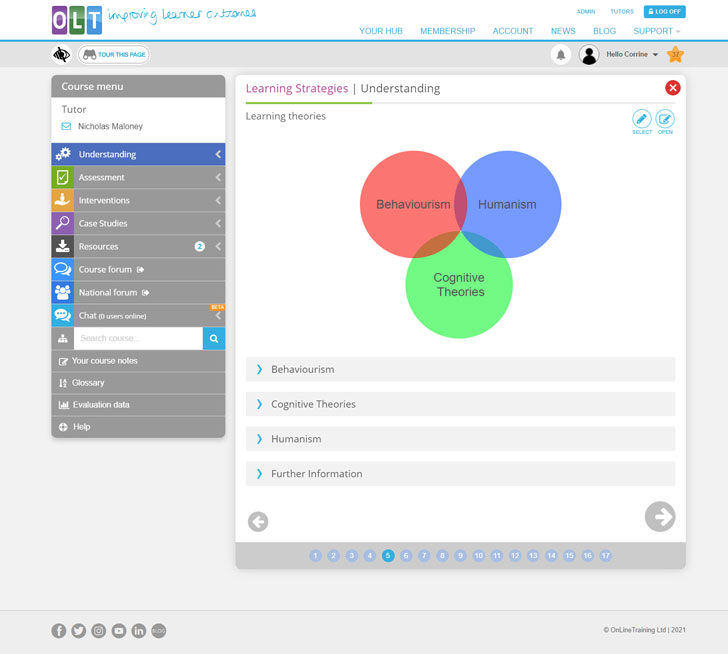
Screenshot from Understanding page 5 - Bloom’s taxonomy
- Behaviourism: classical conditioning
- Behaviourism: operant conditioning
- Behaviourism: social learning theory
- Cognitive theories: Piaget
- Cognitive theories: Vygotsky
- Cognitive theories: information processing
- Cognitive theories: Fitts and Posner
- Humanism
- End of section quiz
- Section summary
Learn about and compare different types of formative and summative assessments. Comprehend the importance of assessment strategies.
- Section objectives and your learner profile
-
What is assessment?
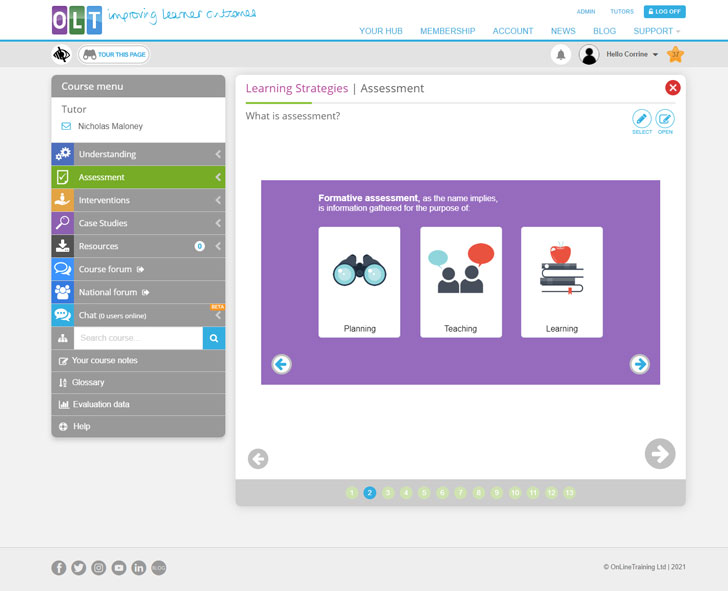
Screenshot from Assessment page 2 - Norm and criterion-referenced assessment
- Norm-referenced tests
- Criterion-referenced assessment
- Curriculum-based assessment
-
Diagnostic testing
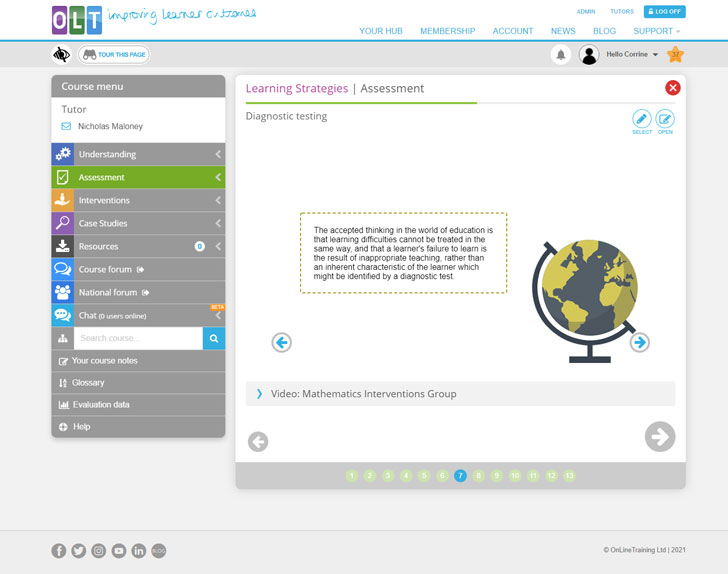
Screenshot from Assessment page 7 - Checklists
- Rubrics
- The instructional hierarchy
- Course assignment: Your learner’s three SMART goals
- End of section quiz
- Section summary
Build a toolkit of the most effective evidence-based strategies to accelerate learning and narrow the gap in achievement.
- Section objectives
- Teaching and Learning: a systems approach
- SMART goal setting
-
Effective interventions
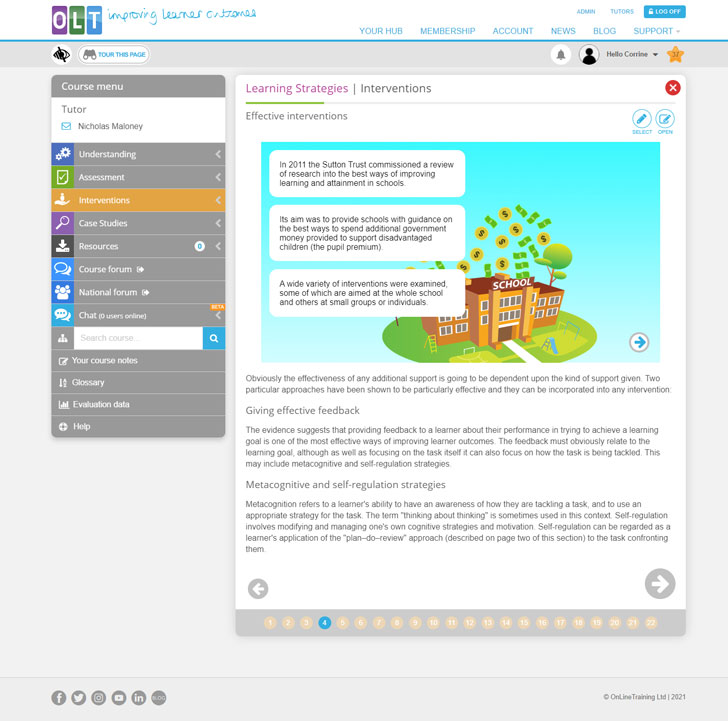
Screenshot from Interventions page 4 - Giving effective feedback
- Scaffolding learning
- Explicit teaching
- Shaping
-
Prompting
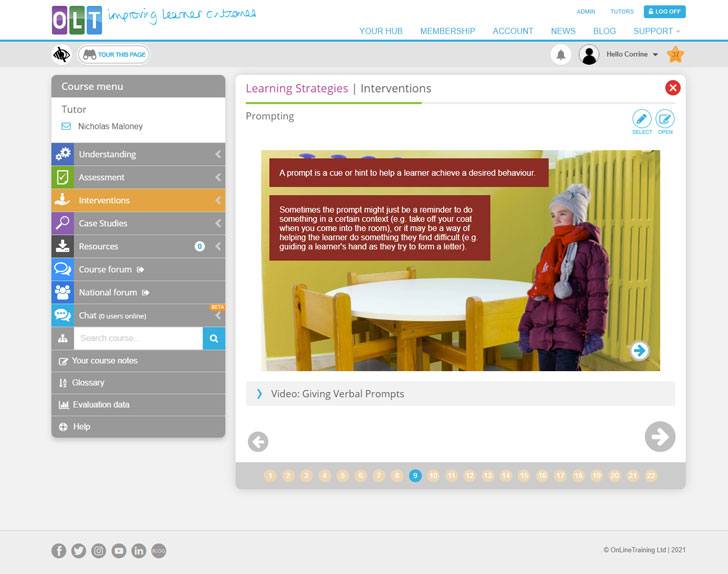
Screenshot from Interventions page 9 - Modelling and demonstration
- Task analysis
- Chaining
- Practice and rehearsal
- Reinforcement & punishment
- ABC interventions
- Differentiating the curriculum
- Individual education plans
- Metacognition: knowing how to learn effectively
- Using additional help in classrooms
- Course assignment: Your learner’s interventions
- End of section quiz
- Section summary
Real examples share the results in schools that deliver ‘precision teaching’ and develop robust and resilient learners.
- Case study: The Grove Primary School, Surrey
- Case study: An introduction to Building Learning Power
Course learning outcomes
On successful completion of the course, you will be able to:
- assess the strengths and limitations of 3 learning theories
- comment on the responsibilities of the teacher/teaching support staff
- maximise the effectiveness of additional help in the classroom
- describe the main characteristics of norm-referenced ‘summative assessments’
- evaluate a range of ‘formative assessments’ including criterion-referenced assessments, rubrics and curriculum-based checklists
- choose from 17 appropriate learning strategies that facilitate learning and the mastery of skills
- apply a graduated approach (assess, plan, do review) to support learners with SEND
- provide pupils with constructive feedback on learning tasks and personal choices
- break tasks down into simple manageable steps
- scaffold learning so the learner can take control and master a task
- implement effective reinforcement and rewards systems
- create a support plan for a pupil/group of pupils in your school
Ready to get started?
Choose the option that works for you.
Explore our SEND training options - from free courses to whole-school subscriptions.
Sign up now
